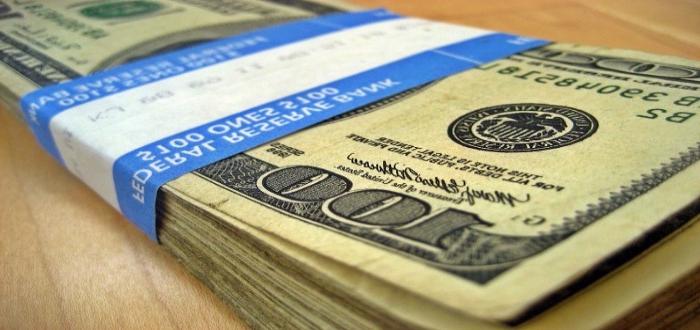The Inevitables: Death and Taxes
August 16, 2021

Photo credit goes to “American Money” by 401(K) 2013 is licensed under CC BY-SA 2.0
The Inevitables: Death and Taxes
Death and taxes, the two inevitables. In a capital-intensive industry like commercial real estate, taxes and interest rates are the two largest expense factors driving the returns for all properties and property types. Of course, we are all aware of the dramatic escalation in property taxes in the past decade, as the appraisal districts push “valuations” higher and higher. It has become a necessity for every property owner to protest their valuations each year, and most employ a property tax consultant for commercial properties.
The 1031 Tax Deferred Exchange
Property taxes are a perennial problem but capital gains taxes only pop up when there is a sale of your property. The 1031 Tax Deferred Exchange has been widely used in commercial real estate since its origination in 1921. Happy 100th Birthday, 1031! As you probably know, this IRS provision allows the Seller of commercial property to make a like-kind exchange into another commercial investment property, if you follow the basic rules: use a Qualified Intermediary, designate your new property within 45 days from the sale of your original property and close the new purchase within 180 days of the first sale, plus some additional conditions to be met.
Biden Administration Targets 1031 Exchange
Now comes the Biden Administration, hungry for new tax revenues and wanting to target the well-to-do. The 1031 Exchange has long been a target in politics and this year is no exception. The April 29th Biden tax proposal includes limiting the maximum that could be deferred to only $500,000. Considering most commercial real estate transactions run into the millions, even tens and hundreds of millions, this would become a severe damper on real estate investments and sales. Fortunately, there is a very large group of lobbyists for real estate in general and commercial property in particular who have rallied strongly to oppose this legislation. Carl Pikus of IPX, a firm specializing in 1031 exchange facilitation, told me his sources say that the 1031 is safe, and the push to limit the amount of deduction probably will go no-where. Whew!
Strong Market Continues
So, the good news is that investment properties, pre-development land and even recreational property are on a tear right now. Green Street, the top international real estate analyst, says overall, properties are up 7% in the first half of the year alone. In San Antonio, future apartment sites, subdivision land, retail pad sites, you name it, are getting offers, even multiple offers at asking prices. Investment properties are relatively hard to find, because most owners don’t want to sell. What would they do with the money, beside buy another property that they don’t know nearly as well? Finding value add / fixer uppers is very difficult and takes special skills honed over years of experience. So just sit tight, push your rents 2% and pay the @#$% taxes, or pass them through to your tenants, who then can’t afford to pay higher rents. Think of the Tax Man as your silent partner in your investment; one who always has first preference on your income; and is your highest operating expense by far, after all.
United States Federal Reserve’s Loan Purchasing Frenzy
I got into this business in 1984 at the tail end of the Big Boom of the 1980’s when Savings & Loans in the Sunbelt were pumping out far too many construction loans. That ended badly in the 7-year RTC times, a very real depression in real estate in Texas where prices fell over 50%, and even 90%. Then, two decades later in 2004-2008, Fannie Mae, Freddie Mac, CMOs and CMBS were pumping far too much money into the housing market, and that ended badly in the Great Recession. But now we have the Federal Reserve of the United States as well aa central banks around the world, pumping too many trillions into the market, pushing up stock prices, pushing down bond prices and jumping up property values. The FED is purchasing $120-Billion in loans every single month! And $40-Billion of that is in mortgages, keeping interest rates ultra-low. The question is, why are they juicing an asset class that is not in trouble? Rather, just the opposite – homes sales are through the roof. Can’t build them fast enough. Perhaps the answer is “politics,” but that is not my area of expertise.
Continuing Uncertainty
So we can all together wonder, how will this one end? Many expect this excessive amount of money in the economic system to cause an increase in inflation. They also expect the FED to keep interest rates lower for longer, maybe too long and this will cause real damage to the economy and our personal lives.
Pros and Cons of Inflation
Real estate generally benefits from inflation because rents can be raised to match the rise in consumer prices. Most real estate is highly leveraged with as much as 75% of the price set in the mortgage at the purchase. It helps that interest rates are currently at historic lows making your interest expense very low. Thanks again, FED. Your mortgage balance only goes down as the mortgage is gradually paid off by the tenants’ rents. As the mortgage goes down, your equity builds up. Your mortgage payment stays the same regardless of inflation, so if the net income increases, all of that increase goes to the owner’s 25% stake. A 1% increase in rents is magnified four-fold. And much of your income is tax sheltered by depreciation write off. Then, your increasing income causes the overall value of the property to rise. For every $1.00 that the net operating income goes up, the value of your property increases by $13.33, assuming a 7.5% capitalization rate. As the value of your property goes up, all of that increase also goes to the owner, not the mortgage holder. A 25% increase in the value of your property doubles the value of your equity /down payment.
While inflation raises rents, it also increases property taxes and other expenses. Historically inflation-pushed rents have more than outpaced other expenses, increasing your net operating income, and that increase goes just to the owner, not the lender.
Unintended Consequences
So, are we in for long term high inflation? Will this strong economic snap-back we are experiencing level off? Or burn out? We live in very interesting times. Surprising events and unintended consequences seem to be the new normal.

